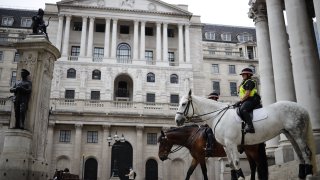
- The Monetary Policy Committee voted unanimously to keep its main lending rate at 0.1% and maintain its target stock of asset purchases at £895 billion ($1.2 trillion).
- U.S. Federal Reserve Chair Jerome Powell said the Fed does not intend to hike interest rates through 2023, and the Bank of England struck a similar tone Thursday.
- It comes after the BOE cut rates twice following the onset of the pandemic from 0.75%, and deployed an unprecedented quantitative easing program.
The Bank of England held interest rates steady on Thursday and mirrored the dovish tone set by the U.S. Federal Reserve on the prospect of future tightening of monetary policy.
The central bank's Monetary Policy Committee voted unanimously to keep its main lending rate at 0.1% and maintain its target stock of asset purchases at £895 billion ($1.2 trillion).
It comes as bond yields around the world have moved higher on expectations of rising inflation, and the possibility that central banks could tighten monetary policy sooner than expected. On Wednesday, however, U.S. Federal Reserve Chair Jerome Powell said the Fed does not intend to hike interest rates through 2023, and the Bank of England struck a similar tone Thursday.
We're making it easier for you to find stories that matter with our new newsletter — The 4Front. Sign up here and get news that is important for you to your inbox.
"The Committee does not intend to tighten monetary policy at least until there is clear evidence that significant progress is being made in eliminating spare capacity and achieving the 2% inflation target sustainably," it said.
The MPC expects annual inflation to return to around 2% in the spring, reflecting the recent rise in energy prices and take earlier falls in oil prices out of the equation.
"These developments should have few direct implications for inflation over the medium term, however. Inflation expectations remain well anchored," the MPC added.
Money Report
The BOE has cut rates twice since the onset of the pandemic from 0.75%, and deployed an unprecedented quantitative easing program, as it looks to steer the British economy toward recovery.
There had been growing speculation about a rate cut into negative territory. Last month, the BOE said British lenders would need at least six months to prepare for a negative interest rate environment, but stressed that it was not planning to deploy such a measure imminently. However, recent developments now have markets assessing when to expect a hike.
Since the last meeting of the MPC, official figures confirmed that the U.K. economy suffered its largest annual contraction for more than 300 years in 2020. However, initial estimates showed GDP contracting by less than expected in January despite the country remaining in lockdown.
In its Budget earlier this month, the British government promised an expansion of its fiscal support to £407 billion in the short term, but mapped out a gradual unwinding of measures and tightening of the public purse.
The U.K. has also made significant progress on its rollout of Covid-19 vaccinations, with more than 24 million people having received at least one shot.
No bond yield pushback
"The Bank of England is clearly following in the Federal Reserve's footsteps with regard to tightening or tapering off monetary support," said Paul Craig, portfolio manager at Quilter Investors.
He added that the outlook for reopening was still too uncertain and the vaccine rollout will be front and center for the Bank, which will maintain the status quo for now, likely resulting in a "tolerated overshoot" for inflation.
However, Aberdeen Standard Investments Senior Economist Luke Bartholomew noted that the Bank has not used its latest policy announcement as an opportunity to "join its colleagues at the European Central Bank in trying to push back against the recent increase in global bond yields."
"Instead, the Bank seems relatively comfortable with the idea that the market moves reflect an improving growth and inflation outlook rather than an adverse and undesirable tightening in financial conditions," Bartholomew said in an email Thursday.
"Indeed the Bank hinted that its current short term growth forecasts will need revising higher in light of the relative strength of the January GDP report and the planned lockdown easing path."






